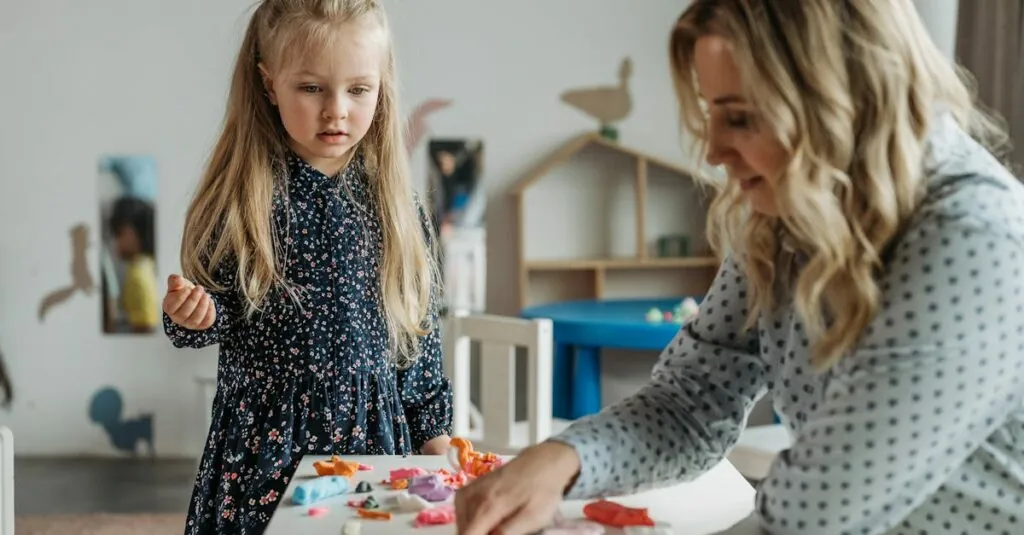In a world where social skills can make or break a future leader, Montessori education steps in like a superhero with a cape made of kindness. Imagine a classroom buzzing with collaboration, empathy, and respect—where children learn not just to share crayons but to share ideas and feelings. Montessori methods foster social skills that help kids navigate friendships like pros, turning potential awkward moments into opportunities for growth.
Table of Contents
ToggleOverview of Montessori Social Skills Development
Montessori education prioritizes social skills development as fundamental to children’s growth. Children engage in collaborative activities that foster teamwork. Empathy emerges as a core value, encouraging children to understand others’ feelings. Respect for differing opinions enhances their ability to navigate social interactions.
Peer interactions within the classroom serve as primary learning experiences. Children learn to share both materials and ideas, cultivating communication and negotiation skills. Problem-solving plays a vital role, as children face social challenges and develop strategies for resolution.
The prepared environment facilitates independent exploration and instills confidence in social settings. Montessori educators guide children in recognizing social cues and responding appropriately, strengthening their emotional intelligence. Participation in mixed-age groups further enriches these interactions, allowing younger children to learn from older peers while developing leadership qualities.
Real-life scenarios presented in the classroom mimic everyday social situations. These realistic contexts equip children with practical skills necessary for successful relations outside school. Role-playing activities enhance their ability to express emotions and practice conflict resolution in a safe environment.
Montessori approaches to social skills development emphasize critical thinking while fostering a sense of community. Children gain not only academic knowledge but also essential interpersonal skills. Understanding individual differences promotes inclusivity and cooperation among peers.
Key Principles of Montessori Method
The Montessori method revolves around several foundational principles that enhance social skills development in children. These principles create a nurturing environment where children thrive socially and emotionally.
Child-Centered Learning
Child-centered learning places the individual needs of children at the forefront of education. This approach empowers children to take responsibility for their own learning journeys. They engage with materials that resonate with their interests and developmental stages. Independence fosters decision-making skills and encourages children to express their needs freely. Social interactions become natural as they work with peers on projects or activities, promoting collaboration and respectful communication. Montessori educators serve as guides, facilitating rather than dictating, which enhances children’s confidence in social interactions.
Active Engagement
Active engagement encourages children to participate fully in their learning experiences. Montessori classrooms provide hands-on activities that require children to collaborate and solve problems with peers. Learning becomes a shared endeavor as they exchange ideas and manage group tasks. Children develop negotiation skills through discussions about their ideas and preferences. Real-world applications of concepts promote critical thinking and social awareness. Active engagement also includes role-playing scenarios that help children practice empathy and understand different perspectives, strengthening their emotional intelligence. The dynamic nature of these interactions supports robust social skills development.
Importance of Social Skills in Early Childhood
Social skills serve as a foundation for future relationships and leadership development. Children in Montessori environments learn to collaborate and empathize, essential traits for effective communication. Sharing ideas and emotions enhances children’s ability to connect with peers.
Effective negotiation skills often emerge from classroom interactions, equipping children to address social challenges. Empathy plays a pivotal role in understanding others’ feelings and differing opinions. Real-life scenarios and role-playing deepen children’s comprehension of social dynamics, fostering conflict resolution.
Mixed-age group participation cultivates leadership qualities in younger children while they observe and learn from older peers. Through collaborative activities, children experience natural social interactions, promoting teamwork and respect.
Observing educators model social cues helps children recognize emotional responses, enhancing their emotional intelligence. Child-centered learning emphasizes individual needs, allowing children to take charge of their learning process.
Active engagement in hands-on tasks encourages problem-solving among peers, which directly influences their capacity for interpersonal relations. Role-playing situations specifically target empathy and diverse perspectives, reinforcing crucial social skills.
Montessori methods prioritize the integration of social skills with academic learning, enriching children’s overall development. Therefore, essential interpersonal skills develop alongside a solid academic foundation, ensuring children are prepared for future social interactions.
Activities Promoting Social Skills in Montessori
Montessori classrooms incorporate various activities that enhance social skills development. Engaging children in these interactive experiences builds their ability to connect with others and navigate social environments effectively.
Role-Playing Scenarios
Children benefit significantly from role-playing scenarios. These activities allow them to practice empathy while stepping into different perspectives. For instance, when acting out various social situations, they learn to recognize emotions and reactions in others. Role-playing also fosters communication skills, as children articulate thoughts and feelings during these exercises. Crafting meaningful narratives encourages collaborative problem-solving and creative thinking. Such immersion nurtures their emotional intelligence, creating a foundation for healthier relationships in the future.
Cooperative Group Work
Cooperative group work serves as another key activity in Montessori education. Children collaborate on tasks, learning how to share responsibilities and viewpoints. Working side by side in mixed-age groups facilitates peer learning. Older peers often model behavior and communication, enhancing social understanding among younger children. Trust develops naturally in these settings, as children must negotiate roles and compromise on solutions. This process strengthens teamwork and inspires respect for diversity in opinions. Engaging in group projects equips children with vital skills for both academic and social success.
Observations and Outcomes
Observations in Montessori classrooms reveal significant growth in children’s social skills. Collaboration occurs daily through group projects and shared tasks, fostering teamwork in various settings. Peer interactions provide a foundation for developing effective communication and negotiation skills.
Outcomes from these interactions include enhanced empathy among children. They learn to recognize others’ feelings and opinions, which strengthens their ability to build meaningful relationships. Children often engage in conflict resolution strategies, applying lessons learned in real-life scenarios that arise during activities.
A noticeable shift in confidence arises as children navigate social challenges. The prepared environment encourages independent exploration, allowing children to take initiative in social settings. Educators guide children as they identify social cues, further enhancing emotional intelligence and awareness of others.
Mixed-age group participation serves as a pivotal aspect of social skills development. Younger children observe and learn from their older peers, cultivating leadership and mentorship qualities. Participation in diverse groups encourages respect and appreciation of different perspectives.
Specific activities abound in Montessori classrooms that directly target social skills. Role-playing scenarios offer children opportunities to practice empathy by stepping into another person’s shoes. Cooperative group work emphasizes sharing viewpoints and responsibilities, which builds trust among peers.
Overall, children graduate from Montessori environments equipped with essential interpersonal skills. These experiences bridge the gap between academic learning and social awareness, preparing children for effective interactions outside of the classroom. Montessori education ultimately positions children to thrive in their future personal and professional relationships.
Montessori education’s emphasis on social skills development equips children with the tools they need for lifelong success. By fostering collaboration empathy and respect within a prepared environment children learn to navigate social dynamics effectively. The integration of mixed-age groups and hands-on activities cultivates leadership qualities and enhances emotional intelligence.
Through role-playing and cooperative work children practice essential interpersonal skills that bridge academic learning with social awareness. As they engage with peers in meaningful ways they develop the confidence to express themselves and resolve conflicts. Ultimately Montessori environments prepare children not just for school but for a future where effective communication and strong relationships are paramount.




